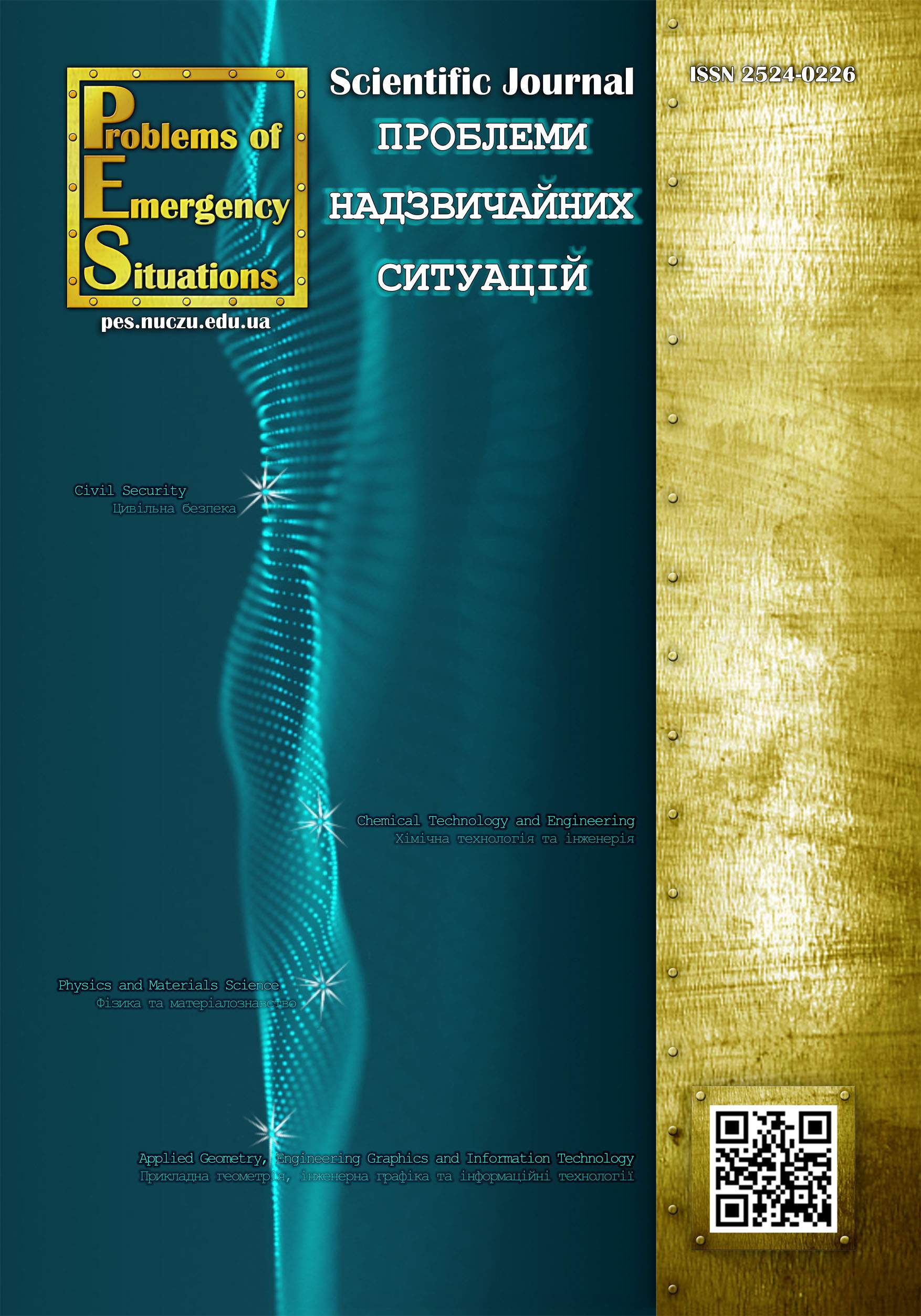Geometric modeling of epihypotrochoid profiles of single screw for MOINEAU pumps
Yevhen Linchevsky
Department of Emergency Prevention, DSNS
http://orcid.org/0000-0002-2571-3352
Leonid Kutsenko
National University of Civil Defenсe of Ukraine
https://orcid.org/0000-0003-1554-8848
Andrii Kalynovskyi
National University of Civil Defenсe of Ukraine
https://orcid.org/0000-0002-1021-5799
Valeriya Semkiv
National University of Civil Defenсe of Ukraine
https://orcid.org/0000-0002-1584-4754
Sergii Nazarenko
National University of Civil Defenсe of Ukraine
https://orcid.org/0000-0003-0891-0335
Elena Sukharkova
National University of Civil Defenсe of Ukraine
https://orcid.org/0000-0003-1033-4728
DOI: https://doi.org/10.52363/2524-0226-2022-36-16
Keywords: geometric modeling, Moineau single-screw pump, epihypotrochoid, conjugate curves, enveloping epihypotrochoid
Аnnotation
A method of calculating the geometric shapes of the surfaces that limit the rotor and the body of models of single-screw pumps of the Muano system is proposed. At the same time, the contours of the normal sections of the rotor and the housing satisfy the condition of mutual conjugation in the coordinate system of a plane that is perpendicular (normal) to the axis of the pump. The concept of epihypotrochoid curves, convenient for calculating the interconnected surfaces of the rotor and the body, is introduced. Which consist of working profiles of periodically located epitrochoids and hypotrochoids. Descriptions of epihypotrochoid curves in a parametric form were found, where each of the equations has the form of a single analytical expression. The interconnectedness of the contours of the normal sections of the rotor and the body is illustrated by means of graphic constructions. Based on this, the following methods have been developed: a) determination of the integral characteristics and contact lines of the epihypotrochoid contours of the rotor and the body of the Muano pumps; b) description of a cylindrical helical surface with an epihypotrochoid normal section. This made it possible to calculate the volume characteristics of the pump cavities. The proposed equations of epihypotrochoid curves can be used to study their differential characteristics – construction of tangents and normals, construction of velocity and acceleration vectors for a point moving along the epihypotrochoid. And it is also convenient to use to study their integral characteristics – calculation of the area of a figure bounded by a closed epihypotrochoid curve, or a figure between two epihypotrochoids. The obtained results can form the basis for the improvement of Muano single-screw pumps, which will expand the range of their application. It should be noted that Muano single-screw pumps are used for pumping various types of liquids, which can be used in the work of emergency and rescue services. The pumps are capable of pumping sewage and sewage water, oil products, foam concrete and sand-cement solutions, etc.
References
- Wittrisch, C., Cholet, H. (2012). Progressing cavity pumps: oil well production artificial lift. Editions Technip, 219. URL: http://www.editionstechnip.com/en/catalogue-detail/641/progressing-cavity-pumps.html
- Nelik, L., Brennan, J. (2013). Gulf pump guides: progressing cavity pumps, downhole pumps and mudmotors. Elsevier, 214. URL: https://www.amazon.com/Gulf-Pump-Guides-Progressing-Mudmotors/dp/0976511312
- El-Abd, F. M., Wahba, E. M., Adam, I. G. (2020). Viscous flow simulations through multi-lobe progressive cavity pumps. Petroleum Science, 17, 768–780. doi: https://doi.org/10.1007/s12182-020-00458-6
- Nguyen, T., Tu, H., Al-Safran, E. Saasen, A. (2016). Simulation of single-phase liquid flow in progressing cavity pump. Journal of Petroleum Science and Engineering, 147, 617–623. doi: https://doi.org/10.1016/j.petrol.2014.07.009.
- Baroiu, N., Morosёanu, G., Teodor, V., Oancea, N. (2021). Roller profiling for generating the screw of a pump with progressive cavities. Inventions, 6, 34, 8 URL:https://www.mdpi.com/2411-5134/6/2/34
- Baroiu, N., Morosanu, G., Frumuşanu, G., Teodor, V. (2021). Study of the stator geometry for a Moineau pump. IOP Conference Series Materials Science and Engineering. January, 1009, 11. doi: 10.1088/1757-899X/1009/1/012003
- Donaldson, J., Feng, Y., Gennip, Y., Grann, H. (2006). Mathematical problems for Moineau pumps. Center for analysis, scientific computing and applications, orthopaedic biomechanics, discrete algebra and geometry, 49. URL:https://research.tue.nl/en/publications/mathematical-problems-for-moineau-pumps/fingerprints/
- Gravesen, J. (2008). The geometry of the Moineau pump. Computer Aided Geometric Design, 25, 9, 792–800. doi: https://doi.org/10.1016/j.cagd.2008.06.012
- Syzrantseva, K., Syzrantsev, V. (2016). Load on multipair contact zones of operating parts of screw pumps and motors: a computer analysis. International Conference on Industrial Engineering, 150, 768–774. doi: https://doi.org/10.1016/ j.proeng.2016.07.104
- Canessa, E., Baruzzo, M., Fonda, C. (2017). Study of Moineau-based pumps for the volumetric extrusion of pellets. Scientific Fabrication Laboratory: The Abdus Salam International сentre for theoretical physics, Trieste, Italy, 17, 9. doi: 10.1016/j.addma.2017.08.015
- Zheng, L., Wu, X., Han, G., Li, H., Zuo, Yi, Zhou, D. (2018). Analytical model for the flow in progressing cavity pump with the metallic stator and rotor in clearance fit. Mathematical Problems in Engineering vilume, 4, 1–14. doi: https://doi.org/10.1155/2018/3696930
- Nguyen, T., Bui, K., Al-Safran, E., Saasen, A. (2017). Theoretical modeling of positive displacement motor performance. Kuwait University, 17, 1–11. https://www.aade.org/application/files/8615/7132/1739/AADE-17-NTCE-026_-_Nguyen.pdf
- Lee, Sang Hyeop, Kwak, Hyo Seo, Han, Gi Bin, Kim, Chul (2019). Design of gerotor oil pump with 2-expanded cardioids lobe shape for noise reduction. Energies, 12(6), 1126, 16. doi: https://doi.org/10.3390/en12061126
- Baldenko, D. F., Baldenko, F. D., Gnoevikh, A. N. (2005). Odnovintovie gidravlicheskie mashini. OOO «IRTs Gazprom», 1. 488. URL: https://rusneb.ru/catalog/010003_000061_a732d201842726ef9d523e4dfc333dc6/
- Linchevskyi, Ye. A. (2010). Heometrychne modeliuvannia epihipotrokhoidnykh profiliv rotorno-planetarnykh mashyn: avtoref. dys. kand. tekh. Nauk : 05.01.01. Kyiv, 21. URL: http://www.irbis-nbuv.gov.ua/cgi-bin/irbis_nbuv/cgiirbis_64.exe.
- Rosokha, S. V., Linchevskyi, Ye. A. (2010). Diferentsіalnі ta іntegralnі kharakteristiki yepіgіpotrokhoїdnikh robochikh profіlіv rotorno-planetarnikh mashin: navch.-metod. posіb. Kharkіv: NUTSZU, 80. URL: https://discovery.kpi.ua/ Record/000287103
- Rosokha, S. V., Kutsenko, L. M. (2007). Geometrichne modelyuvannya ob'єmіv robochikh kamer rotorno-planetarnikh trokhoїdnikh mashin: monografіya. Kharkіv: UTSZU, 176 URL: http://www.irbis-nbuv.gov.ua/cgi-bin/irbis_nbuv/cgiirbis_64.exe














